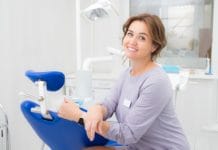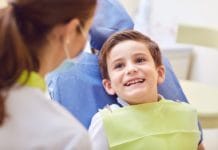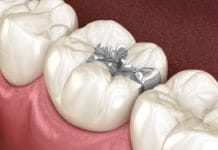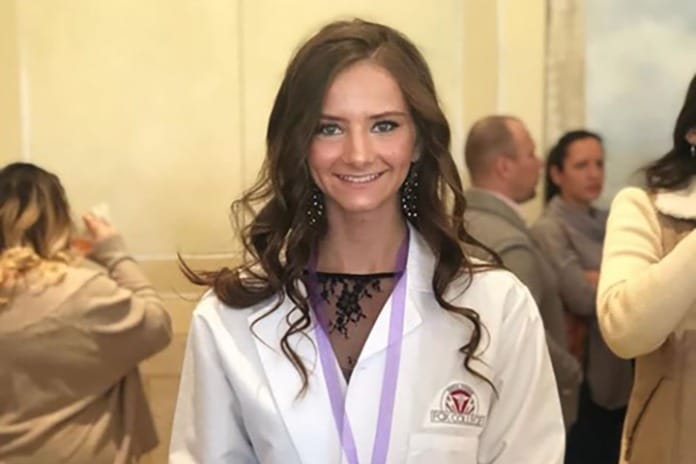
Angie Abramowicz is a recent, 23-year-old graduate of Fox College in Chicago. A first-generation American, Abramowicz offers a unique perspective about embarking on a career in dental hygiene.
It was exciting to learn more about Angie and her goals and dreams for her professional future.
In recent months, Decades of Dental Hygiene has interviewed Fran Tourdot, Barb Orth, Renee Ahlf, Kelli Dash, Kym Dallstream, and Lori Cackovic about a wide variety of career experiences in dental hygiene.
Jensen: Angie, tell me a little bit about your family background?
Abramowicz: My parents came to America from Poland 25 years ago. My dad was a mechanic in Poland, as well as here in America. My mom finished culinary school in Poland but found work at a pharmaceutical company. I have an older sister who was born in Poland. I have an 11-year-old brother who really looks up to me as a role model. I never want to disappoint him or my parents.
All of our extended family still lives in Poland. I have two high school diplomas. I graduated from Stagg High School as well as from a Polish high school, Polska Szkota. I went to Polish school every Saturday from kindergarten through high school.

Jensen: Tell me about your experience in your dental hygiene program.
Abramowicz: I started by taking many prerequisite courses, including three English composition courses, chemistry, biology, microbiology, anatomy and physiology, sociology, ethics, general math, psychology, nutrition, and a humanities course.
My program was very expensive for my parents, and I just wanted to do well. We were all women in my program. The youngest was 19, and I was just 20 when the program started. The oldest student was 35. We all came from a variety of cultural and ethnic backgrounds − Polish, Greek, Arabic, and Hispanic.
Jensen: Where did your interest in the dental field begin?
Abramowicz: My sister stressed that working in health care was a good profession. When I was 13, I had braces, and I just loved my orthodontist’s office. I even started dental assisting at this office. I loved taking care of people. Helping people. Knowing that when the patient left, they felt better and were more confident in performing their oral care.
Jensen: Do you have any special memories from dental hygiene school?
Abramowicz: We had an elderly gentleman and his caregiver present at our clinic. He was 92 years old. He moved very slow. He came in with 12 pages of medical history and medication lists. His caregiver stated he has dozens of bottles of medications.
Upon assessment, it was clear a referral was going to be needed for this gentleman. He had severe periodontal disease and rampant decay. Extractions were going to be necessary. We asked him to sit in our reception area as we prepared the referral to our specialist. I handed him a magazine to read while he and his caregiver waited. It was at this moment, he informed all of us he was legally blind.
We all were amazed, and how he effortlessly moved about with the assistance of his caregiver, and none of picked up on this fact. It was a teaching moment for us all!
I was also the student delegate for District VIII at the 2018 ADHA meeting in Columbus, Ohio. This was a fantastic experience. I applied for the position by writing an essay and filling out an application. Everyone I met during this meeting was kind and understanding. They all wanted to help me in any way that they could. I networked with many RDHs from all over the country and gained valuable resource information at the product exhibits and CE courses. I was so impressed with being on the floor at the House of Delegates and to see how it is such a formal process, but that anyone can be heard and express their opinion.
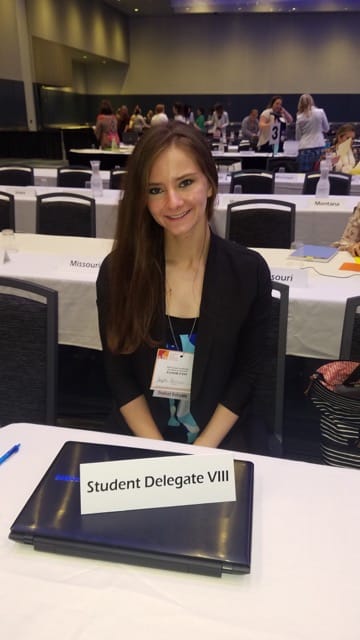
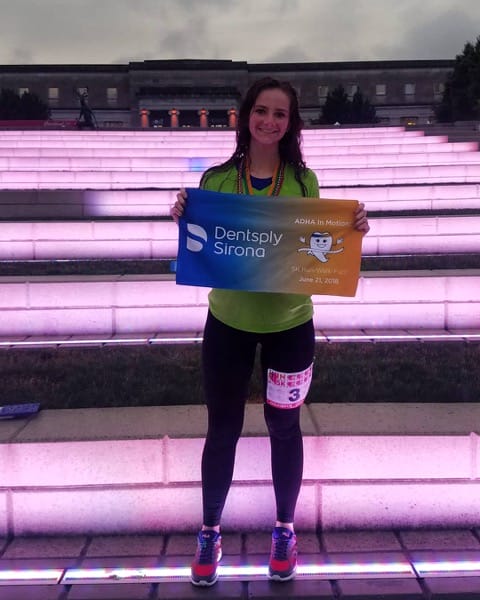
Jensen: As a past ADHA Delegate, I agree with you completely. Tell me about your current work schedule. Was it difficult to find a dental hygiene position?
Abramowicz: I am currently working in three different general dentist offices. I’ve been working for about a year, and I have learned something new every day. The other RDHs I work with have been helpful in guiding me towards being more open and conversational with my patients.
Protocols from one office to the next are not the same. I am grateful for my education and the fact that I had experience working in a dental office as a dental assistant before looking for a dental hygiene position.
I did many working interviews, and this was eye-opening. One working interview office gave me 20 minutes for an adult dental cleaning. Thirty minutes was scheduled if a full series of x-rays were to be taken. I did not have an assistant. I had a mirror, explorer, and a 204S sickle scaler as my setup. That was it!
Some offices wanted every single patient to have SRPs, even with healthy 3mm probings. It was not about the patient; it was about making a certain dollar amount every single day. I worked sitting on chairs that were broken. I would look through chart notes and see that patients had not had probings recorded since 2013 and had 6-7mm pockets with radiographic calculus. It was clear which offices I never went back to after these experiences.
Jensen: I can’t even imagine seeing an adult every 20 minutes. OK, let’s switch things up. What do you do for fun? Favorite read? Favorite TV show? Social media fan?
Abramowicz: I work out every day. I must exercise in order to feel good. Reading for me right now is all around school. I just started a bachelor’s completion program in dental health at Lewis University in Romeoville, Illinois. I should finish in about 18 months. Between work and school, that leaves little time for TV!
I’m really into experiencing new cafés and coffee shops in Chicago. I try and do a new one every week. As for social media, I generally don’t care for much of what is out there. I like to stay connected with friends and family and to learn about professional products. But, unfortunately, I see it as a way that can take down a person’s confidence and self-esteem. It is a constant comparison to fake things. A false perception of life. I’ve seen people flaunt expensive things and fake vacations. My age group is hooked on their phones − Facebook, Instagram, Snapchat. Everything you see is not real.
Jensen: What do you hope to then do with your degree?
Abramowicz: I have always wanted to get my bachelor’s degree. As a first-generation American, I wanted to make my parents proud. Education is very important to them. I want them to feel that coming to the United States was worth it for them and their family. I hope to someday teach or work in another area of the dental hygiene profession. Education will open more doors for me. I want to keep my options open.
Jensen: As a recent grad and someone just entering your professional career, what more would you like to see done within our profession? What else would you like to do?
Abramowicz: I would love to see all RDHs with the capability to work independently in their own practices; RDHs owning their own business and referring to a dentist. Most everything I have seen demonstrates that treatment is insurance-driven. This might not be the best treatment for that patient. I’d also love to do mission trip work in the future.
Jensen: What are some things or products that you cannot work without?
Abramowicz: An ultrasonic with an assortment of good insert tips, my loupes with light, and I do like the NEVI thin tip instruments.
Jensen: Final question. Give me three words that describe you.
Abramowicz: Determined, introvert/extrovert, and empathetic.
Phone interview completed 02/06/2020






